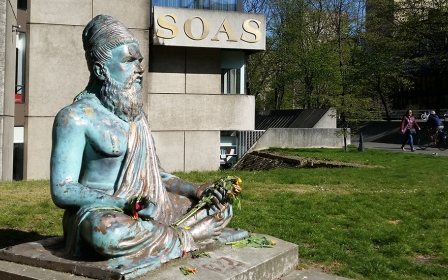Downing Street 'blocked candidates for student role over opposition to Prevent'

British Prime Minister Theresa May’s political advisers intervened in the selection process to appoint the board of a new universities regulator to ensure candidates who had expressed opposition to the Prevent counter-terrorism strategy were rejected, according to a government watchdog report.
The report into the appointment of the board of the Office for Students found that the process to appoint of a board member responsible for representing the interests of students was “heavily influenced” by advisers working in May’s 10 Downing Street office.
According to the report, which was published on Monday by the Commissioner for Public Appointments, emails and documents showed “a desire amongst ministers and special advisers not to appoint someone with close links to student unions, like the National Union of Students”.
But this had not been “made clear in the advertised candidate information,” the commissioner, Peter Riddell, wrote in the report.
Three out of 133 candidates who applied for the role had been considered appointable by education ministers but all were rejected, according to the report.
In a letter submitted to the commissioner’s office, the Department for Education said that it had taken advice from Cabinet Office and Downing Street officials and advisers in regard to the Office for Students’ remit to regulate the implementation of Prevent on campuses.
“In particular, ministers took into account the policy context and new legal remit of the Office for Students to regulate the implementation of universities’ legal responsibilities on Prevent and on free speech,” the letter said.
“Ministers concluded that it would undermine the intended policy goals of the new regulator to appoint student representatives who publicly opposed the Prevent duty and/or supported no-platform policies.
“Taking all of these factors into account, ministers concluded that none of the candidates were right for the role.”
But the commissioner concluded that the selection process had been tarnished by “serious shortcomings in terms of fairness and transparency”.
The National Union of Students opposes the Prevent Duty, which requires universities and other public bodies to “have due regard to the need to prevent people from being drawn into terrorism”.
Critics of Prevent say that it undermines academic freedoms, threatens free speech on campus, and is discriminatory against students from Muslim and ethnic minority backgrounds.
Middle East Eye last year reported on how universities were being advised to “manage” contentious issues including pro-Palestinian activism, criticism of western foreign policy and opposition to Prevent itself.
Last week, MEE also exposed how London’s School of Oriental and African Studies, where the student union has boycotted Prevent, has faced pressure from the current higher education regulator and the Charity Commission, to implement Prevent more actively.
The post of student representative on the Office for Students’ board was eventually filled on an interim basis by Ruth Carlson, a civil engineering student at the University of Surrey.
Higher education minister Sam Gymiah stated last month that the selection process to find a permanent appointee would be re-run later this year.
But Gymiah was criticised by Riddell over his handling of Carlson’s appointment.
“It was only when I noticed that Ruth Carlson was not among the names considered by the interview panel that it became apparent that she had been appointed without a competition,” Riddell wrote in a letter to Gymiah also published on the commission’s website on Monday.
“This is in clear breach of [the governance] code which states that, in the exceptional cases of appointing without a competition, ministers ‘must make the decision public alongside their reasns for doing so. They must consult the Commissioner for Public Appointments in good time before the appointment is publicly announced’. Neither condition was fulfilled.”
The Office for Students takes over from the Higher Education Funding Council for England (HEFCE) as universities regulator in April.
Riddell's investigation into the recruitment process followed furore over the appointment to the Office for Students board of Toby Young, a controversial journalist and commentator who was quickly forced to resign after a litany of offensive past remarks on social media were recycled in the media.
Downing Street said it was routine for ministers to ask for advice from officials and advisers before taking decisions on appointments.
"The commission has reaffirmed the importance of undertaking more due diligence and the government will act on the commissioner's advice," a spokesperson told journalists.
The Department for Education said in a statement: “We welcome the commissioner’s report and will carefully consider his recommendations.”
Stay informed with MEE's newsletters
Sign up to get the latest alerts, insights and analysis, starting with Turkey Unpacked
Middle East Eye delivers independent and unrivalled coverage and analysis of the Middle East, North Africa and beyond. To learn more about republishing this content and the associated fees, please fill out this form. More about MEE can be found here.




